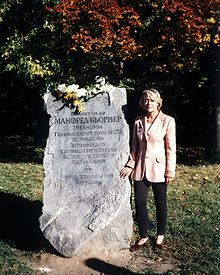- Manfred Wörner
-
Manfred Hermann Wörner (24 September 1934 in Stuttgart-Bad Cannstatt – 13 August 1994 in Brussels[1]) was a German politician and diplomat. He served as the defense minister of West Germany between 1982 and 1988. He then served as the seventh Secretary General of NATO from 1988 to 1994. His term as Secretary General saw the end of the Cold War and the German reunification. Whilst serving in that position, he was diagnosed with cancer, but, in spite of his illness, continued serving until his final days.
Contents
Family
He grew up in his grandfather's house in Stuttgart-Bad Cannstatt and attended the Johannes-Kepler-Gymnasium there. He was married to Elfie Wörner, who was supporting several German army related humanitarian agencies, and who died due to a tumor at 4 July 2006.
Education
After graduation in 1953 he studied Law at Heidelberg, Paris, and Munich. He closed his studies 1957 with the first and 1961 the second Staatsexamen. He got his Dr. jur. in 1961 writing about International law. Afterwards he worked for the administration of Baden-Württemberg. He was a county official for Oehringen until 1962, for the Baden-Württemberg Landtag until 1965 and the County Göppingen.
Wörner was a jet pilot and reserve officer of the Luftwaffe.
Political career
Wörner was a member of the German CDU and was elected to the German parliament.
On 14 October 1982 he was appointed Federal Minister of Defence in Helmut Kohl's government. Wörner played an important role in defending NATO's decision to deploy intermediate-range ballistic missiles IRBM after arms reduction talks with the Soviet Union to reverse Soviet deployment of its SS-20 intermediate-range ballistic missiles IRBM from the years before.
In 1983, Wörner faced criticism due to the scandal surrounding German General Günter Kießling. The German military secret service had accused Kießling of being homosexual - this was later revealed to be a case of mistaken identity - and Wörner had ordered Kießling's early retirement, as homosexuality was considered a security risk at the time. Kießling insisted on disciplinary procedures against himself and eventually achieved his reinstatement. Wörner accepted political responsibility for the affair and on 18 May 1984 offered his resignation, which was however rejected by German Chancellor Helmut Kohl.
In December 1987, the sixteen members of NATO elected Wörner Secretary General. He was the first German to be appointed to that position. Resigning from his post in the German government, he took office on 1 July 1988. He executed his duties despite severe illness until his death from cancer in 1994.
Manfred Wörner Medal
Since 1996, the Ministry of Defense has awarded the Manfred Wörner Medal on an annual basis to honour public figures who have rendered "special meritorious service to peace and freedom in Europe".
Since then it was given to:
- 1996, Richard Holbrooke, US diplomat and Special Envoy in Bosnia and Kosovo
- 1997, Ewald-Heinrich von Kleist-Schmenzin, publisher and initiator of the Munich Conference on Security Policy
- 1998, Dr. Gerd Wagner (postmortem), for the implementation of the Dayton Agreement
- 1999 Dr. Janusz Onyszkiewicz, Minister of Defense of Poland
- 2000 Elizabeth Pond, American Journalist
- 2001 Karsten Voigt, Coordinator at the German State Department for the German-American Cooperation
- 2002 Javier Solana, the EU's foreign policy chief and former Secretary General of NATO
- 2003 Prof. Dr. Catherine McArdle Kelleher, U.S. Naval War College and former Head of the Aspen Institute Berlin
- 2005 Hans Koschnick
- 2006 Christian Schwarz-Schilling
- 2007 Martti Ahtisaari
- 2009 Jörg Schönbohm
See also
Honours
Wörner Gap on Livingston Island in the South Shetland Islands, Antarctica is named after Dr. Wörner in recognition of his contribution to European unification.
References
- ^ "Vor 10 Jahren: Manfred Wörner stirbt". Westdeutscher Rundfunk. 2004-08-13. Archived from the original on 2005-09-14. http://web.archive.org/web/20050914143500/http://www.wdr.de/themen/kultur/stichtag/2004/08/13.jhtml. Retrieved 2006-01-18.
Political offices Preceded by
Hans ApelFederal Minister of Defence (Germany)
1982 – 1988Succeeded by
Rupert ScholzDiplomatic posts Preceded by
Peter CaringtonSecretary General of NATO
1988 – 1994Succeeded by
Willy ClaesSecretaries General of NATO Lord Ismay | Paul-Henri Spaak | Dirk Stikker | Manlio Brosio | Joseph Luns | Lord Carrington | Manfred Wörner | Sergio Balanzino | Willy Claes | Sergio Balanzino | Javier Solana | Lord Robertson of Port Ellen | Alessandro Minuto-Rizzo | Jaap de Hoop Scheffer | Anders Fogh RasmussenDefence Ministers of Germany Weimar Republic
(1918-1933)
Third Reich
(1933-1945)
Werner von Blomberg (1933-1938)
East Germany
(1949-1990)
Willi Stoph · Heinz Hoffmann · Heinz Kessler · Theodor Hoffmann · Rainer Eppelmann
Federal Republic of Germany
(1949-)
Theodor Blank · Franz Josef Strauß · Kai-Uwe von Hassel · Gerhard Schröder · Helmut Schmidt · Georg Leber · Hans Apel · Manfred Wörner · Rupert Scholz · Gerhard Stoltenberg · Volker Rühe · Rudolf Scharping · Peter Struck · Franz Josef Jung · Karl-Theodor zu Guttenberg
Categories:- 1934 births
- 1994 deaths
- People from Stuttgart
- Secretaries General of NATO
- Defence ministers of Germany
- Members of the Bundestag
- Christian Democratic Union (Germany) politicians
- Cancer deaths in Belgium
Wikimedia Foundation. 2010.


